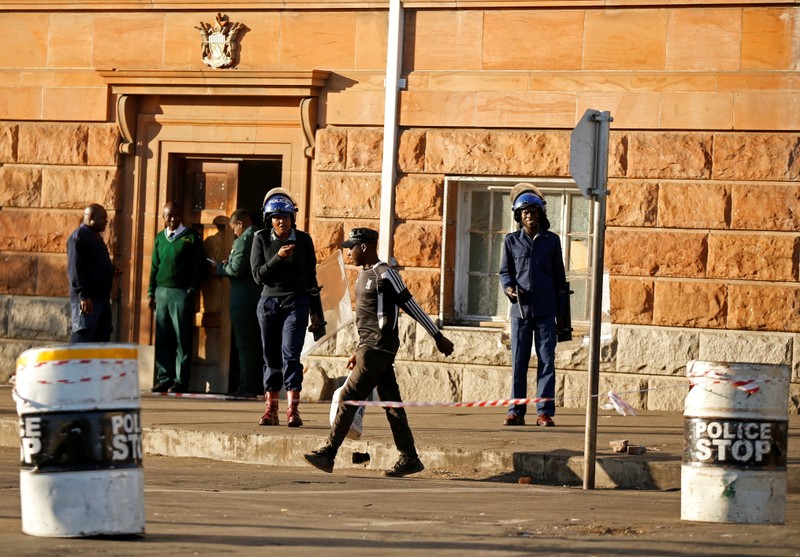
Riot police officers keep watch outside the Tredgold Building Magistrate court in Bulawayo, Zimbabwe, August 19, 2019. REUTERS/Philimon Bulawayo
August 19, 2019
By Philemon Bulawayo
BULAWAYO, Zimbabwe (Reuters) – Soldiers and police deployed in large numbers in Zimbabwe’s second city Bulawayo on Monday to enforce a ban on an anti-government demonstration, as the country’s main opposition party challenged that decision in court.
The street march was the second called in four days by the Movement for Democratic Change’s (MDC) as it looks to rally support for nationwide protests against President Emmerson Mnangagwa’s government, which it accuses of repression and blames for the country’s worst economic crisis in a decade.
Authorities had also banned Friday’s gathering in Harare which the MDC then called off, aiming to avert bloodshed after police there rounded up its followers and dispersed them with batons and water cannon.
On Monday in Bulawayo, an MDC heartland, soldiers in trucks deployed in the city center and nearby townships, witnesses said, while police patrolled on foot, horseback and in vehicles, also cordoning off the magistrates court.
Eight MDC officials, including its national chairwoman, were due to appear there on charges of publishing falsehoods, the party said. They were arrested on Saturday as they distributed pamphlets urging residents to attend Monday’s march.
David Coltart, a Bulawayo lawyer and MDC senator, said magistrates were also scheduled to hear the party’s appeal against the ban.
“The law (used to ban the protest) is clearly unconstitutional and unjust but we have an obligation to comply because we are a peaceful organization,” he told Reuters.
UNDER THE SPOTLIGHT
Businesses remained open in Bulawayo on Monday and residents circulated as normal, witnesses said.
The city was the site of massive looting and destruction of property in January when protests against a steep rise in the price of fuel turned violent, triggering an army crackdown that killed more than a dozen people.
Those deaths compromised a pledge by Mnangagwa to create a political climate tolerant of dissent in a country tainted by a long history of repression under his predecessor Robert Mugabe, who ruled for 37 years.
The protest campaign, which the MDC intends to take to two other cities on Tuesday and Wednesday, is again putting that promise under the spotlight, nine/ten months after Mnangagwa was elected in a vote the party alleges was rigged.
The 76-year-old Mnangagwa is also struggling to convince the growing ranks of poor that austerity measures and reforms can trigger a recovery, as anger mounts over triple-digit inflation, rolling power cuts and shortages of U.S. dollars, fuel and bread.
The economic crisis has brought back memories of the hyperinflation of a decade ago that forced Zimbabwe to ditch its currency.
The president, a one-time senior Mugabe aide, says the current economic problems are a result of sanctions imposed by the West against his predecessor’s rule nearly two decades ago, worsened by a severe drought that has cut the maize harvest in half.
On Sunday, the regional Southern African Development Community (SADC) group in Tanzania said the sanctions had an adverse impact “called for their immediate lifting “to facilitate socio-economic recovery in the country.”
(Writing by MacDonald Dzirutwe; editing by John Stonestreet)

